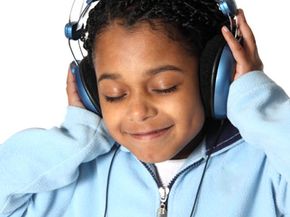Music and Happiness
The neurological studies of music on the brain seem to indicate that we're hardwired to interpret and react emotionally to a piece of music. Indeed, this process starts very early on. One study found that babies as young as five months old reacted to happy songs, while by nine months they recognized and were affected by sad songs [source: LiveScience]. Physiological states brought on by music only intensify as we grow. Happy music, usually featuring a fast tempo and written in a major key, can cause a person to breathe faster, a physical sign of happiness [source: Leutwyler]. Similarly, sad music, which tends to be in the minor keys and very slow, causes a slowing of the pulse and a rise in blood pressure. That seems to indicate that only happy music is beneficial, but those that know the value of a good cry or a cathartic release may find that sad or angry music can bring about happiness indirectly.
Knowing that music has this impact on the body may eventually influence treatment and care for a wealth of patients. For example, music has been found to boost the immune systems of patients after surgeries, lower stress in pregnant women and decrease the blood pressure and heart rate in cardiac patients, thus reducing complications from cardiac surgery [sources: Lloyd, Wiley-Blackwell]. Researchers at Cal State University found that hospitalized children were happier during music therapy, in which they could experiment with maracas and bells while a leader played the guitar, than during play therapy, when their options were toys and puzzles [source: Hendon and Bohon]. Music therapy has also proven to be more effective than other types of therapies in patients suffering from depression, and it's been shown to lower levels of anxiety and loneliness in the elderly [sources: Parker-Pope, Berger].
Advertisement
You don't have to be sick, though, to benefit from the reduced stress and increased happiness that music can bring. Live music may be the most potent happiness trigger because it provides a way to forge social bonds. When you get in a room with people who like the same thing you do, you might create more friendships, a proven factor in the search for happiness.
However, it's worth noting that too much music could be too much of a good thing. Since music triggers reward systems in our brains much like drugs do, music could also become an addiction that becomes impossible to feed. Having music around us constantly -- from department stores to elevators to our headphones -- could numb us to its effects. Unplugging that iPod every now and then might just help your favorite song sound sweeter later on.
Related HowStuffWorks Articles
Sources
- "Babies Know Happy from Sad Songs." LiveScience. Oct. 9, 2008. (May 18, 2009)http://www.livescience.com/culture/081009-babies-music.html
- Berger, Alisha. "A Fountain of Youth, in Music Class." New York Times. June 15, 1999. (May 18, 2009)http://www.nytimes.com/1999/06/15/health/vital-signs-therapies-a-fountain-of-youth-in-music-class.html?n=Top/Reference/Times%20Topics/Subjects/A/Aged&scp=4&sq=%22music%20therapy%22,%20depression&st=cse
- Binns, Corey. "Why Music Gives Us the Chills." LiveScience. Nov. 20, 2006. (May 18, 2009) http://www.livescience.com/health/mm_061120_music_chills.html
- Blood, Anne J. and Robert J. Zatorre. "Intensely pleasurable responses to music correlate with activity in brain regions implicated in reward and emotion." Proceedings of the Natural Academies of Sciences. Sept. 25, 2001. (May 15, 2009)http://www.zlab.mcgill.ca/docs/Blood_and_Zatorre_2001.pdf
- Brunel University. "Jog to the Beat: Music Increases Exercise Endurance by 15%." ScienceDaily. Oct. 2, 2008. (May 15, 2009)http://www.sciencedaily.com /releases/2008/10/081001093753.htm
- Carmichael, Mary. "Sing, Brain, Sing." Newsweek. Sept. 22, 2008. (May 15, 2009)http://www.newsweek.com/id/158755
- Elie, Paul. "The Music Man." Slate. Oct. 8, 2007. (May 15, 2009)http://www.slate.com/id/2175460/
- Hendon, C. and L.M. Bohon. "Hospitalized children's mood differences during play and music therapy. Child: care, health and development. 2007
- Horan, Tom. "Can music make us happy?" The Telegraph. Nov. 24, 2006. (May 18, 2009)http://www.telegraph.co.uk/culture/music/3656733/Can-music-make-us-happy.html
- Hsu, Jeremy. "Music-Memory Connection Found in the Brain." LiveScience. Feb. 24, 2009. (May 18, 2009)http://www.livescience.com/health/090224-music-memory.html
- Lemonick, Michael. "Music on the Brain." Time. June 5, 2000. (May 18, 2009)http://www.time.com/time/classroom/psych/unit1_article5.html
- Leutwyler, Kristin. "Exploring the Musical Brain." Scientific American. Jan. 22, 2001. (May 18, 2009)http://cogweb.ucla.edu/ep/Music_Leutwyler_01.html
- Lloyd, Robin. "Amazing Power of Music Revealed." LiveScience. Oct. 15, 2008. (May 18, 2009)http://www.livescience.com/health/081015-music-power.html
- Parker-Pope, Tara. "Using Music to Lift Depression's Veil." New York Times. Jan. 24, 2008. (May 18, 2009)http://well.blogs.nytimes.com/2008/01/24/using-music-to-lift-depressions-veil/
- Phillips, Helen. "The pleasure seekers." New Scientist. Oct. 11, 2003.
- Thompson, Clive. "Music of the Hemispheres." New York Times. Dec. 31, 2006. (May 18, 2009)http://www.nytimes.com/2006/12/31/arts/music/31thom.html?_r=1&scp=1&sq=music,%20neuroscience&st=cse
- University of Goldsmiths London. "Listening to Music Can Change the Way You Judge Facial Emotions." Science Daily. May 7, 2009. (May 15, 2009)http://www.sciencedaily.com /releases/2009/05/090506152809.htm
- University of Warwick. "Gifted Students Beat the Blues with Heavy Metal." ScienceDaily. March 22, 2007. (May 18, 2009)http://www.sciencedaily.com /releases/2007/03/070321130834.htm
- Weinberger, Norman M. "Music and the Brain." Scientific American. September 2006.
- Wiley-Blackwell. "Music Reduces Stress in Heart Disease Patients." ScienceDaily. April 16, 2009. (May 18, 2009)http://www.sciencedaily.com /releases/2009/04/090409104303.htm
- Wiley-Blackwell. "Soothing Music Reduces Stress, Anxiety and Depression During Pregnancy." ScienceDaily. Oct. 14, 2008. (May 18, 2009)http://www.sciencedaily.com /releases/2008/10/081006093020.htm
- Zatorre, Robert. "Music, the food of neuroscience?" Nature. March 17, 2005.
